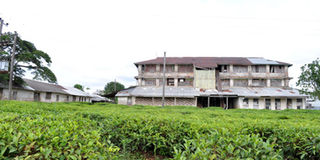Prime
Tea exporters urged to exploit new market opportunities, experts say

A dilapidated structure of Namutamba Tea Factory in Mityana. Mr Mabala advised players to lobby government for assistance to set up the warehouses where they can collectively bulk the tea to export bigger volumes to new markets just like Kenya is doing. PHoto BY Rachel MABALA.
What you need to know:
Growth in exports. Uganda’s total tea exports to the world grew by 15.8 per cent in value.
Analysts have advised Uganda’s tea exporters to directly export the commodity to emerging markets globally to increase revenue. Currently, about 97 per cent of all the tea produced in Uganda is exported and sold through the Mombasa tea auction and branded as Kenyan.
Experts say this has stifled Uganda as the second biggest producer of tea in Eastern Africa but also at the auction, the country loses out on the prime prices. In an interview with Prosper magazine, UEPB’s export promotion officer, Mr Moses Mabala, shares: “We are seeing emerging markets for Ugandan tea from countries like Russia, Pakistan and the Middle East.”
A proxy take on price as a basis for export potential shows that countries such as Belarus, Qatar, Hong Kong, Canada, and France offer better prices for the same unit of tea exported to Kenya.
“For instance, a tonne of tea exported to Kenya fetches $1,627 (Shs4.2 million) and the same unit would cost $8,539 (Shs22.2 million) in Hong Kong, $8,689 (Shs22.5 million) in Qatar and $11,190 (Shs29 million) in Belarus,” Mr Mabala observed.
This means if Ugandan tea can be exported to the above mentioned countries directly, her exports would earn prime prices.
Opportunities
Global demand for tea reached $6.1 billion (Shs15.8 trillion) in 2013; while the import demand for tea has been relatively strong for the past several years. This has been because of high petroleum prices which have boosted tea imports of petroleum exporting countries such as Russia, Pakistan and many of the Middle East oil exporters.
Russia is the biggest importer of tea in the world followed by USA, UK, Pakistan and Egypt, respectively. Uganda’s total tea exports to the world grew by 15.8 per cent in value from $73.9 million (Shs192 billion) in 2012 to $85.5 million (Shs222 billion) exported in 2013.
Quantities exported also posted a positive growth trend of 12.3 per cent from 55,210 tonnes in 2012 to 62,018 tonnes in 2013.
It should be noted however, that Kenya’s tea exports are largely re-exports from Uganda, Rwanda, Burundi and Malawi through the Mombasa auction to make for large volumes exported.
Challenges
A source who preferred anonymity for not being the spokesperson of Uganda Tea Association says the country’s challenge is lack of facilities like warehouses to collectively store the tea from the different growers. “Setting up warehouses is a very costly venture. That is why it’s cheaper to export through Mombasa,” the UTA source observed.




